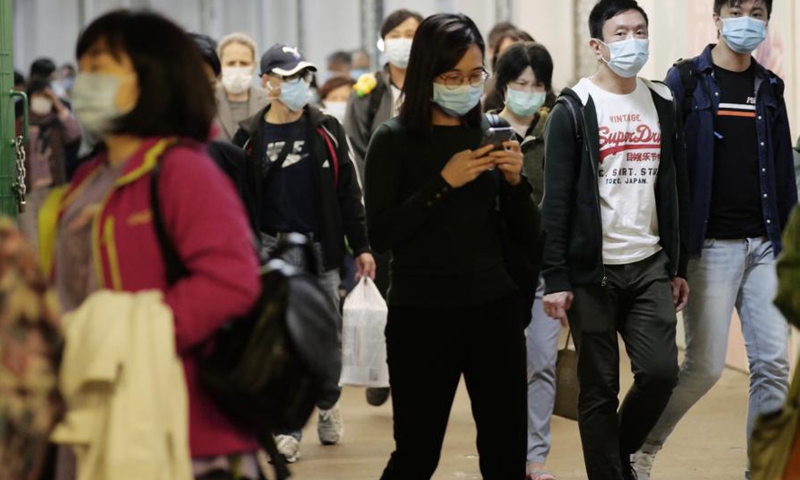HK top court rules anti-mask law completely constitutional, ‘an important step in restoration of rule of law’
Source: Global Times Published: 2020/12/22 0:34:08

Residents wearing face masks walk out of Star Ferry Pier in Tsim Sha Tsui, Hong Kong, south China, Dec. 10, 2020. (Xinhua/Wang Shen)
Hong Kong’s top court on Monday ruled the mask ban at public gatherings imposed by the Hong Kong Special Administrative Region (HKSAR) government amid last year’s turmoil is constitutional, as it is necessary for dealing with the riots, local media outlets reported on Monday.
An expert termed the verdict as a self-correction by the Hong Kong judiciary, which is an important step in restoring the rule of law.
The ban on masks at protests and rallies, whether authorized or not, is “proportionate and no more than reasonably necessary to prevent violence,” ruled a five-judge panel at the Court of Final Appeal unanimously on Monday.
The mask ban was imposed invoking the Emergency Regulations Ordinance (ERO) at the peak of the anti-government riots last October, during which many protesters wore facial masks to hide their identities.
Later, opposition lawmakers challenged the constitutionality of the statute in the court, thus kicking off a yearlong legal battle.
The court held that although the power under the ERO to make regulations in cases of "emergency" or "danger to public security" is broad, it is not unconstitutional, and is still subject to judicial control, the "negative vetting" of the Legislative Council, and the Basic Law. In addition, the Court noted that the prohibition of masks at unauthorized assemblies and peaceful rallies was proportional, and that the restrictions were intended to prevent and curb peaceful assemblies from turning violent.
The final court’s decision ends the controversy surrounding one of the most important moves of the HKSAR government to deal with the city’s yearlong social turmoil.
Li Xiaobing, an expert on Hong Kong, Macao and Taiwan at Nankai University in Tianjin, told the Global Times that the ruling is expected.
“In terms of basis, the SAR government has the power to enact the law, which is conferred by the ERO and is consistent with the Basic Law.
In terms of content, it does not impose restrictions on the freedom of assembly, but rather on the actions of lawbreakers who use their anonymous status to disrupt social order,” Li noted, “It is an effective tool for the SAR government to protect Hong Kong in emergency situations.”
In April, a court in Hong Kong had ruled the anti-mask law partially unconstitutional, implying facial coverings should be allowed at legal public demonstrations. Neither side was satisfied with the decision, and the matter was taken to higher courts.
The Court of Final Appeal went further to settle the debate. “The interests of Hong Kong as a whole should be taken into account since the rule of law itself was being undermined by the actions of masked lawmakers who, with their identities concealed, were seemingly free to act with impunity,” wrote the judges in the final judgment, the South China Morning Post reported.
The court's ruling on the constitutionality of the anti-mask law is also an important step in restoring the rule of law in Hong Kong, Li said. “The anti-mask law, along with the national security law for Hong Kong, has been an important step in getting the Hong Kong society back on track in terms of the rule of law.”
In recent months, members of the Hong Kong judiciary have been advocating judicial reform. This ruling on the constitutionality of the anti-mask law is also a self-correction before the possible reform of the Hong Kong judiciary, Li noted.
RELATED ARTICLES:
Posted in: LAW,CHINA FOCUS